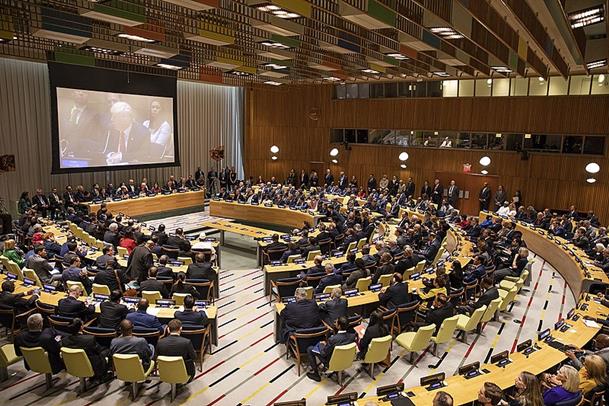In his latest interview with Radio Sputnik International, Srdja Trifkovic discusses President Donald Trump’s speech to the UN General Assembly and contrasts his defense of national sovereignty with French President Emanuel Macron’s advocacy of multilateralism before the same forum. The first question concerned Trump’s suggestion that his Administration has already accomplished more than almost any other in U.S. history. [Audio]
ST: First of all, as far as social cohesion goes, America is a more fractured, more divided society now than ever in its history. We can see that the liberal left has absolutely no standards when it comes to destroying their opponents, the example of Judge Brett Kavanaugh to wit. On the other hand, its current economic success story is undoubtedly impressive. It is open to debate to what extent this is the result of policies set in motion by the previous administration, or by global and domestic trends which were not particularly influenced by Trump’s decisions; or whether his decisive stand on tax reduction programs and increasing tariffs against foreign imports has resulted in a new wave of confidence in the domestic market. In terms of an objective assessment, it’s far too early to tell. I don’t think that the parallel with the greatest achievements in the U.S. history stands when it comes to the rates of growth: America under Eisenhower in the 1950’s did very well, even better than today. As far as America’s global standing is concerned, let’s not forget that its share of the global economy in 1960 was around 40 percent; today it is only about one half of that.
Sputnik: Trump’s speech was followed by that of French President Emmanuel Macron. Many would say that was an absolute opposite. Macron condemned nationalism, pledged to promote multilateralism and supported globalism; what are your thoughts on how pertinent his speech was in the format of the UNGA?
ST: Emmanuel Macron’s speech was a blast of stale air, not fresh air. Macron stands for all the failed platitudes and certainties of the old multilateralist globalist order of the 1990’s and 2000’s. He certainly stands for an ever-tighter (European) Union, mandated and dictated from Brussels. We already see resistance to this approach in the form of Brexit west of the (English) Channel, and in the Visegrad Four: Poland, the Czech Republic, Slovakia and Hungary in the east; and of course, with the rebellion in Italy. Macron actually wants Brussels to have ever-tighter control, and he also wants to eradicate those really beautiful and essential national differences ultimately embodied in national sovereignties that give Europe strength in diversity. We see that his own attempts to integrate unassimilable and unassimilated millions of Muslims into the French society have failed; why should we believe him that it would work on a pan-global or pan-European basis?
Sputnik: And yet, President Trump’s speech was met with laughter while Macron’s speech drew applause from the audience.
ST: Because the cognoscenti of the UN General Assembly belong to the post-modern elite class of post-nationalists who have more in common with each other than with members of their own nations. I think that it would have been worrying had his speech been greeted with applause and Macron’s with derision; that would have meant that the global elite was shifting allegiances and paradigms of its value system. It will do its own thing, but it has been surpassed by developments. I’m in particular hopeful that, in Europe, Macron’s solutions to things like the migrant invasion, identity and sovereignty is a thing of the past. Brussels has been defeated, thank God, and Macron is the voice if the defeated.

Leave a Reply